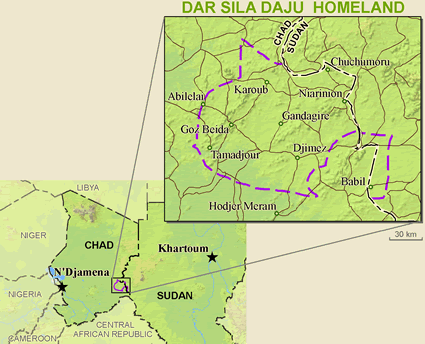The five Daju groups make up some of the oldest communities in western Sudan and eastern Chad. Their history is one of independent rule and war with their neighbors. During the twelfth and thirteenth centuries, the Daju migrated from the east and established rule over a number of tribes in the Dar Fur region of Sudan. In the sixteenth century, this dynasty was overthrown by the Tunjor. Fortunately for the Daju, however, their king escaped and set up a small kingdom in the Dar Sila region of Chad. Today, some of the Dar Sila have moved back into Sudan, while the once-ruling Dar Fur of Sudan have mostly migrated westward to the oases of the region. The Daju in Chad call themselves "Daju Sila," and those in Sudan call themselves "Fininga." Some of the other groups are either named after the regions they occupy or after the distinct dialects of Daju they speak. One of the Daju groups is the Bokoruge.
Most of the Bokoruge are farmers, and their economy is primarily based on grain production. Staple crops include millet, sorghum and corn. Other foods such as cereals, grasses, berries, honey and wild fruits are gathered from the forests. They also hunt.
The homes in Bokoruge villages are usually round and have cone-shaped roofs. Town homes are generally rectangular in shape, with mud-brick walls and flat roofs. Boys and girls of the villages become members of social groups and work groups. They perform community chores such as keeping the villages clean and organizing village dances.
The Bokoruge are a patriarchal society in which the families are dominated by the older men. All parents desire to have a male heir, so sons are pampered while they are young children. When a boy reaches adolescence, his "representative" will approach the parents of a young woman and propose marriage. Young men are given many responsibilities, such as preparing the fields for cultivation, planting the crops, buying the livestock and trading in the market.
Bokoruge women are subordinate to the men. A woman's responsibilities include sowing the millet and sorghum, grinding the grain, preparing the meals, buying dry meat in the marketplace, selling chickens and eggs and bearing as many children as possible. Wives are expected to please their husbands and to raise the children without the aid of their husbands.
Bokoruge women have many unique beauty customs. They whiten their teeth with sticks; tattoo their eyelids, gums, and lips with acacia thorns; and often remain bare breasted among relatives.
At one time, a sultan (Muslim ruler) had total authority over all of Daju tribes. Today, however, sultans only possess nominal authority, such as presiding over religious ceremonies. The sultanate is passed down from father to son, and the family of a sultan is granted special rights and privileges. The Daju tribes are subdivided into clans (extended family groups), and each clan has a leader called letuge. The letuge is responsible for assisting the sultan, as well as helping to give direction during times of war.
The Daju take great pride in their past war victories. They have a reputation among their neighbors and former French and British colonial administrators as being an explosive, warlike people. This is partially due to their mountainous homeland which has made them difficult to control.
The Bokoruge Daju have been a Malikite Muslim people since the fifteenth century. They revere the Koran, and all oaths and commitments are made according to its writings. Newborn babies are even given water that has been used to wash a board with Koranic scriptures written on it. It is believed that if a person swears, he must do so by Allah, or otherwise remain silent.
Although the Bokoruge Daju are almost entirely Muslim and follow Islamic teachings daily, they do not do so in the strictest sense. For example, Friday prayer at the mosque is not attended by all, and the restriction of alcohol is often ignored. In addition, many of their traditional animistic beliefs have been retained and mixed in with their Islamic beliefs. In their animist religion they form cults, they worship good and bad spirits and they practice witchcraft.
Much intercession and evangelistic efforts are needed to reach the Bokoruge with the gospel.
Ask God to raise up prayer teams that will begin breaking up the soil through worship and intercession.
Pray for God's favor to be on missions agencies ministering to the Bokoruge.
Pray that God will provide greater freedom to live and work among the Bokoruge.
Ask God to use the small number of Bokoruge believers in Sudan to share Christ with their own people.
Pray for peace among all Daju tribes including the Bokoruge.
Ask the Lord to raise up strong fellowships of believers among the Bokoruge.
Scripture Prayers for the Bokoruge in Chad.
| Profile Source: Joshua Project |











